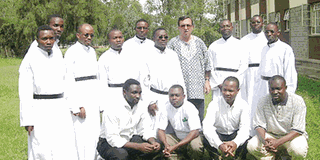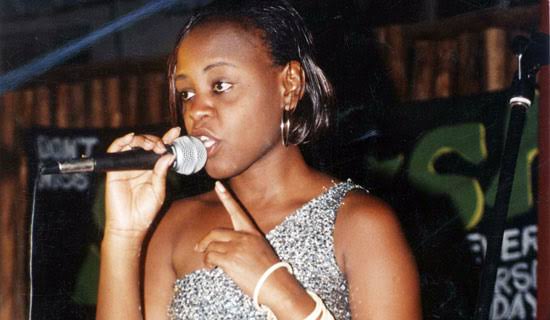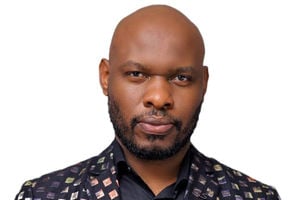Prime
Misconceptions and culture bias Basoga youths about priesthood

The number of young men offering themselves for priesthood is noticeably diminishing.
What you need to know:
The ratio of young priests to old is becoming lower, especially in Busoga region. This has caused anxiety amongst priests and those charged with handling the continuity of faith, writes Pauline Kairu.
Uganda does not yet suffer a shortage of priests, but the number of young men offering themselves for priesthood is noticeably diminishing. During a recent Sunday Mass at St Jude Catholic Church in Iganga town, Rev Fr. Jude Owori made an appeal to the church asking for intercession.
“Please parents, send us children to join priesthood and serve the almighty God,” he urged the congregation saying last year the region had been lucky to graduate five new priests.
He however observed that the number was far less for Busoga region compared to the other regions. The only few serving priests cannot serve the growing number of Christians and expanding churches, he observed. The Father evoked excitement at the church when he said the Bishop for Jinja Diocese had recently booked all unborn babies to join him in the vocation and play different church duties and roles.
Rev Fr Owori’s call for more children to join the calling is another reminder. The same supplication was made by Rev Fr Steven Ndanda of Iganga Parish; he urged Christians to heed his constant call to build the foundation of the church not only by prayer, baptism and confirmation, wedding among others as true and complete catholic Christians, but by parents sending some of their children to join priesthood or church duties to keep the candle of the church burning.
Apparently, the five major seminaries in Uganda (Katigondo, Alokulum, Kinyamasika, St. Mbaaga, Ggaba and Ggaba National) have intakes of students from all over Uganda each year, but the Busoga region relatively sends the lowest number.
The current ratio of one active priest to the number of baptised Catholics in the Diocese of Jinja, is a dangerous trend, according to Fr Peter M. K. Mubiru, the Coordinator, Commission for Justice and Peace, Diocese of Jinja. At the only minor seminary in the diocese - the Uganda Martyrs’ Minor Seminary located on Rubaga Hill in Jinja, only less than 50 boys from senior one to six are currently enrolled at the seminary, although it has a capacity of 100 boys. The Diocesan Bishop, Charles Martin Wamika, while campaigning for vocations on his pastoral visits, said should a diocese have 100 boys joining the minor seminary, only 10 percent or less may qualify and get to be ordained to the priesthood. So for every 10 boys, one should expect no more than one boy to be ordained.
Sad state of affairs
The challenge lately has been that majority of the people erroneously think that priests contribute little to the social and political development in society. This materialistic view, Fr Mubiru says, seems to deter many parents from encouraging their sons to join seminaries.
“Secondly, there seems to exist a widely vague idea of what priesthood, in general, is all about among our Basoga people. It seems many them imagine that one must first fail in what they consider meaningful occupations in life before they can opt for priesthood as a last resort,” observes Fr Mubiru.
Still, the priest notes that levels of poverty could be another reason why many parents fail to send children to seminaries.
“There was some misconceived but widely spread belief that if a boy went to the seminary, Rome would educate him from point A to point Z. Today, it’s evidently clear that should anyone desire to join the seminary, his parents will have to foot the financial costs in terms of school fees in the Minor Seminary and some reasonable cost-sharing in the Major Seminary. This thinking has not helped the situation,” he remarks.
The priest also hints at the “negative publicity” coupled with rather minimal influence of Catholics in public life. In our settings, especially the rural areas where one finds many baptised Catholics, most people holding public offices are normally not of the Catholic faith! It’s sad to note that even in our Roman Catholic-founded schools and post primary institutions, in spite of the clear guidelines of the New Educational Act, those in management are of religious denominations other than Catholic. The quality of influence therefore leaves much to be desired.
The other issue Fr Mubiru pointed out as crucial, was the Catechetical Instruction and Formation. Without necessarily accusing anyone in particular, Fr Mubiru decried the apparently nonchalant way all those concerned were imparting the catechetical instruction and the subsequent formation (popularly known as the ‘mugigi instruction and Christian formation), which he considered rather poor.
“Most of the catechists entrusted with the immense task of instructing children, especially in our rural areas, are those whose ages only indicate that they should have retired long ago,” he says, “While these might have been vigilant and relevant for their time, our times demand different approaches and instructional pedagogies. As if that is not enough, the remuneration allocated to them by their employers (in this case the parents of such children) is normally far wanting and it would be both unfair and unreasonable for anyone to expect miracles at the end of the day.”
Also, the deplorable academic standards of village schools (mostly UPE) from which so many vocations are to be expected has left so much to chance and divine providence, the priest says. While a minor seminary will require and accept children who are intellectually sound and academically fit for the seminary studies, those primary schools are normally incapable of producing such boys.
“While the diocese and its seminary may be thirsty for entrants, they are very critical of who to actually admit and however good a soul a particular boy may demonstrate, the intellectual/academic qualification requirement must be met,” he says, adding, “After all, popular commonsense points to the fact that only brains that can grasp philosophical concepts, digest logic and concentrate on studies can internalise theology and measure up to the managerial and administrative tasks of the ministerial priesthood.”
Another problem is the fact that parents at the family level, where one would expect to find a domestic church (the ecclesiae domestica,) are more preoccupied with other things other than taking their formation tasks seriously. “I trust that Busoga region would have vocations to the priesthood, both in quality and quantity, but parents consider it a duty of the priest and the catechist to form children’s consciences,” Fr Mubiru notes.
Also, in Busoga region, the clan system seems to be more based on divorce rather than reconciliation. No wonder, it is difficult to know the exact number of clans our Basoga people have. It appears, he said, that clans in Busoga keep multiplying, largely depending on the degree and incidents of agreement or disagreements within given Busoga communities. This makes the family cohesion rather weak especially from the cultural point of view, and consequently affects what a people chooses as a priority! The priest associated this trend of things to the apparent stalemate in the present Kyabazinga succession saga.
And as we all know, priest’s families are a powerhouse in churning out vocations. Many of today’s priests are relatives of priests, but this trend seems to be crumbling too. Lack of holiness among the laity is seen to be another contributing factor to this problem. As much as priests promote holiness amongst the flock, if the laity does not make prayer and live a life of faith and charity, then there is less space for young men to discern the vocation, a thing that is not helped by the fact that it is becoming increasingly hard in our busy schedules to create space for prayer.
Fr Mubiru was however hopeful that, “Jesus Himself will not allow His Church to have a lack of priests to teach, preach and heal in His vineyard, which He Himself promised that ‘even the gates of the underworld would never destroy’. Priests will always be few, but the few qualitative ones will get the Church going.




